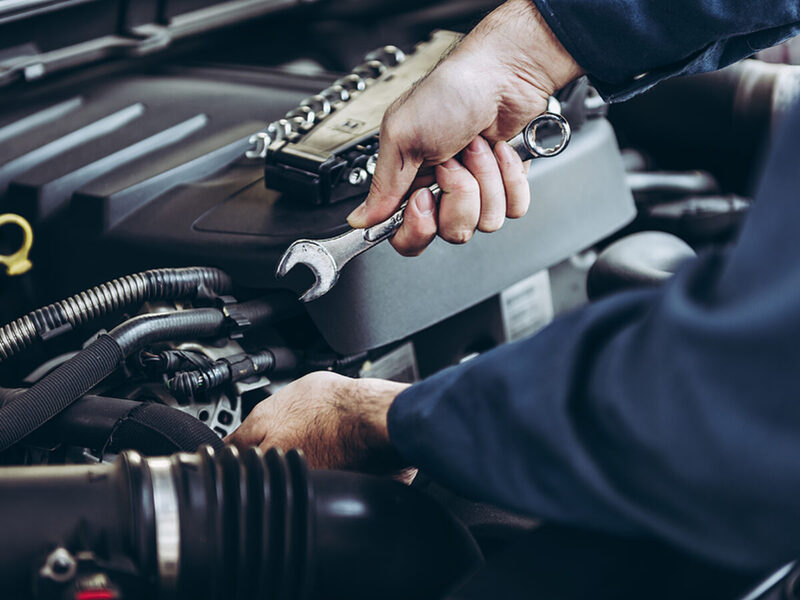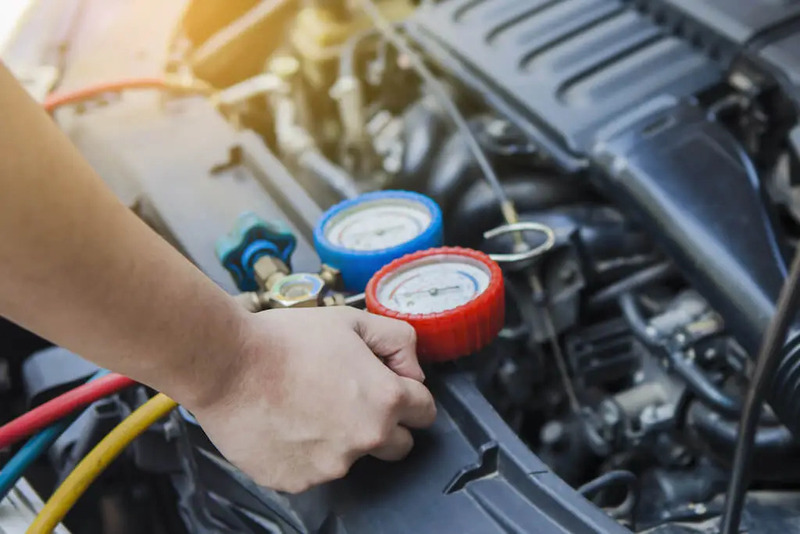The vehicle’s AC has multiple parts, and any faulty components can cause the air conditioning system to fail. Apart from the mechanical parts in the air conditioning system of a car, it still depends on a refrigerant to function. One popular refrigerant used in vehicles is Freon.
Whenever there is too much Freon in car or even a shortage of Freon, the car A/C will also develop issues.
In this article, we will examine the importance of Freon in the air conditioning system, discuss the impacts of excessive Freon in a car’s AC unit, and how we can determine the quantity of Freon in the Car’s A/C system.
Let’s begin!
What Happens When There Is Too Much Freon In Car?
When there is excessive refrigerant in your AC, it can lead to damage in the compressor. This can happen when the excess refrigerant which would likely collect inside the compressor and cause subcooling, in the normal temperature state. Also, the extra refrigerant can fill the compressor thereby damaging its mechanical parts.
Freon is a popular type of refrigerant that is used in both car and home AC units. You might be surprised to know that Freon is not the actual name of the refrigerant because “Freon” is a trademark name used by DuPont to market a product known as R22.
R22 is the first non-flammable and non-toxic refrigerant developed by Thomas Midgley Jr in 1928. However, the use of R22 was restricted by several environmental laws put in place to reduce the harmful effects of refrigerant properties on the environment.
One characteristic of the refrigerant is that it can deplete the ozone layer, causing an increase in the Earth’s greenhouse effect.
Currently, preparations are being made to stop the production of Freon refrigerant and shift the air conditioning industry to use more environmentally friendly refrigerants.
As of the year 2021, the production of the Freon refrigerant was stipulated to end; however, some household appliances which use Freon as their refrigerant are still in use currently but are estimated to fade out in the next ten years.

What is the Cause of Too Much Freon in Car?
Issues with Compressor
The compressor is a major component in every air conditioning system. Its main purpose is to compress and circulate the refrigerant; however, if the compressor develops a fault, it can malfunction and over-compress and stop excessive Freon while charging the AC system.
AC Overcharging
Charging is the process of adding refrigerant to the air conditioning units. Sometimes if the technician is not paying attention to the charging pressure gauge, he might overcharge the air conditioning units.
Sometimes, fully equipped or quack technicians will also make this mistake. Adding excessive freon into a car’s AC can cause several issues in the car’s AC system.
Also Read: Does Coolant Affect AC? (Explained)
Symptoms of Too Much Freon in Car
Excess freon in your car AC system can cause a wide range of problems for your AC unit. However, there are ways to know that there’s an excessive freon in your AC units. Some of the symptoms that indicate excessive freon in your AC unit include;
Circulation of Air Stops
Air conditioning systems in different car models and brands work differently. Some car models and brands have increased safety features that prevent the car’s air conditioning system from functioning if there is any irregularity in the Freon pressure.
Therefore, to protect the air conditioning system from any impending damage due to the high quantity of Freon, some car manufacturers designed their A/C units not to function.
The Compressor may Get Spoilt
One way to know that you have an overcharged AC is when your compressor breaks down after a recent AC servicing. The valves and seals in the compressor will be put under undue stress, resulting in a damaged compressor.
However, if you are observant enough, you can prevent the extra cost of fixing a compressor by checking your pressure gauge.
There can be Issues with the Engine
As many know, the air conditioners compressor is powered by the engine.
Therefore, whenever the compressor needs to do more work, it consumes more power from the engine, leading to poor acceleration, rough idling, and increased fuel consumption.
You might sometimes start experiencing noises emanating from the belts in your engine bay.
Whenever you experience any of these issues and put off your air conditioner to rectify the fault, then excessive freon in your AC unit might be the problem.
Guage Showing High Pressure
There is one easy and visible way to detect if your car’s AC unit is overcharged, which is why checking your pressure gauge.
If your AC pressure gauge displaces higher temperatures and higher pressure, your AC is overcharged.
Low Cooling
One way to know that your air conditioning system has excessive Freon is that it will lose its ability to blow out cool air. In some cases, the air from the air conditioning vents in your car will have higher temperatures than the ambient temperature of your car’s cabin.
This lack of cooling effect is caused by the excessive liquid freon in the air conditioning system that does not have enough space to depressurize.
Noise in Compressor
One major challenge you will start experiencing whenever your air conditioning is overcharged is compressor noises. These compressor noises are caused by the inability of the freon to decompress from liquid to a gaseous state. Hence the compressor struggles to push a larger quantity of refrigerant in liquid form over a longer distance, resulting in some unpleasant noises.

What to Do When You Have Too Much Freon in the Car
Excessive freon in your air conditioning unit can be dangerous and cost you a lot if left unchecked for too long.
Therefore whenever you start experiencing any of the symptoms mentioned above, you should seek professional help or, if you have enough technical knowledge, discharge freon from your air conditioning unit.
Employing an expert’s services is advisable because they would run diagnostic checks to ensure your AC is void of leaks.
How to Fix Too Much Freon in Car
Time and money can be saved if you know how to discharge your car’s AC. Here are simple steps to follow if you want to discharge freon from your air conditioning unit;
- First, you must determine if the AC unit uses pure refrigerant by using a refrigerant purity tool to test the refrigerant sample.
- Next, Connect the blue line from the discharge machine to the low-pressure port and the red hose to the high-pressure port.
- Activate the discharge machine and discharge the refrigerant by vacuuming the AC system.
- If the car does not use pure refrigerant, use a filter to prevent other substances from entering the machine.
- Keep discharging until the pressure reaches zero. At this point, the freon in the AC is now fully discharged.
However, you must understand that if you do not feel any pressure while discharging, your AC system has a leak and must be fixed immediately.
Once you are done discharging your car’s AC unit and fixing all the needed repairs, you can recharge the system with the right quantity of Freon.
Finally, due to the environmental hazards caused by the refrigerant, you must be careful not to dump it just anywhere, like the drainage, trashcans, or garbage trucks; however, handing it over to a qualified technician to dispose of it properly is advisable.
Also Read: Why Is My Car AC Not Blowing Cold Air?
Frequently Asked Questions – Too Much Freon In Car
Will car AC work if overcharged?
Your car’s AC will not work malfunction if it is overcharged. Sometimes your car AC will not work at all if a safety feature prevents it from preventing damage to your air conditioning system.
How much does it cost to remove Freon from a car?
On average, discharging Freon from your car can cost around $150 to $400. However, the main factor that determines the cost of this procedure is the auto mechanic’s labor cost
How do you release freon?
To release Freon from your gas, you can open the valve on the high-pressure hose to allow Freon to escape for a few seconds before measuring the refrigerant pressure, and if it is not still at its recommended pressure, then you can release more.
Conclusion – Too Much Freon In Car
Excessive Freon in your AC unit can cause diverse problems for your car. It can cause simple problems like reduced airflow from your AC vent, lack of cooling, and slightly unpleasant noises from your AC unit.
It can also cause severe problems like damaging your compressor, reducing your vehicle’s acceleration, increasing fuel consumption, and reducing overall performance. Whenever you experience excessive freon ln your car AC unit, it is always advisable to employ the services of an expert to get it fixed as soon as possible.

